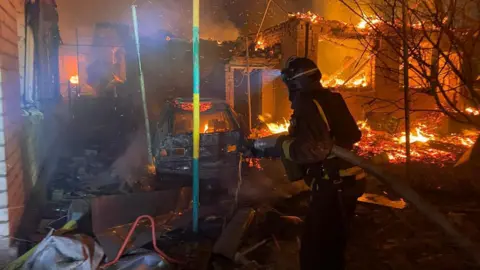In a striking revelation, a comprehensive global survey has confirmed that 2024 marked a record year for forest loss, with an alarming rate of 18 soccer fields disappearing every minute. The data, presented by researchers from the University of Maryland and the World Resources Institute, highlights that the loss of pristine rainforests alone amounted to 6.7 million hectares, nearly doubling the previous year's figures.
This deterioration in the world's forests is chiefly attributed to wildfires, which, for the first time since records began, surged ahead of agricultural practices as the leading cause of deforestation. Reports suggest that these devastating fires contributed significantly to climate change, emitting approximately 4.1 gigatons of greenhouse gases, a staggering figure that surpasses emissions caused by air travel in 2023.
Additionally, while wildfires were pivotal, human activities related to land clearing for agriculture and livestock farming also escalated by 14%, representing the sharpest rise observed in almost a decade. Peter Potapov, co-director of the Global Land Analysis and Discovery Lab, voiced concerns about the ramifications of this trend, warning that it could permanently alter vital ecosystems and release massive volumes of carbon into the atmosphere, thereby exacerbating climate change and the frequency of extreme wildfires.
The joint findings distill a critical message: urgent action is required to address the rampant deforestation and habitat destruction that threaten the climate and biodiversity across the globe. With forests serving as essential carbon sinks, their loss poses a profound challenge in combatting climate change and ensuring a sustainable future.
This deterioration in the world's forests is chiefly attributed to wildfires, which, for the first time since records began, surged ahead of agricultural practices as the leading cause of deforestation. Reports suggest that these devastating fires contributed significantly to climate change, emitting approximately 4.1 gigatons of greenhouse gases, a staggering figure that surpasses emissions caused by air travel in 2023.
Additionally, while wildfires were pivotal, human activities related to land clearing for agriculture and livestock farming also escalated by 14%, representing the sharpest rise observed in almost a decade. Peter Potapov, co-director of the Global Land Analysis and Discovery Lab, voiced concerns about the ramifications of this trend, warning that it could permanently alter vital ecosystems and release massive volumes of carbon into the atmosphere, thereby exacerbating climate change and the frequency of extreme wildfires.
The joint findings distill a critical message: urgent action is required to address the rampant deforestation and habitat destruction that threaten the climate and biodiversity across the globe. With forests serving as essential carbon sinks, their loss poses a profound challenge in combatting climate change and ensuring a sustainable future.



















